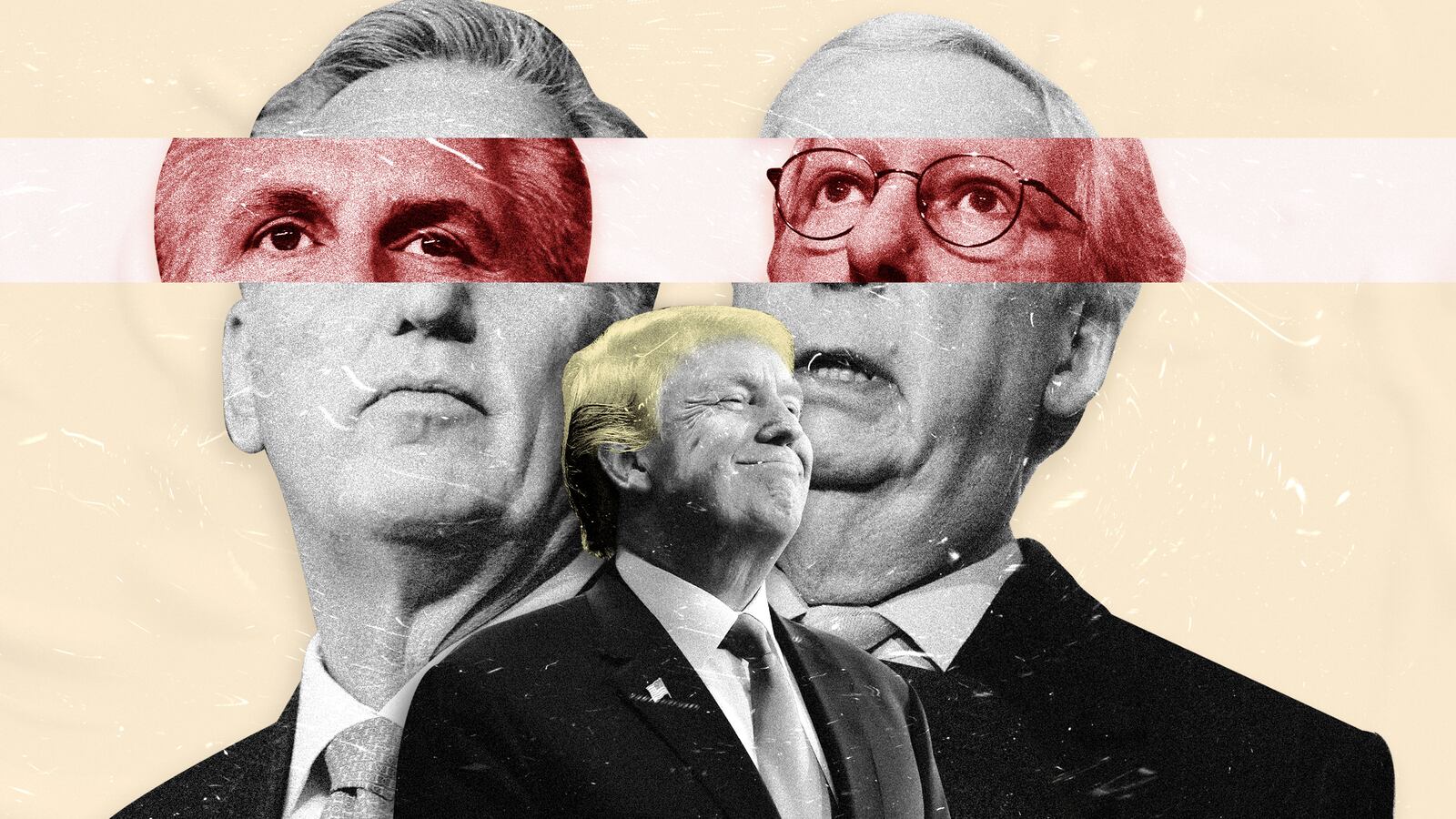Imagine you’ve been abducted. You’re chained to a radiator. Then one day, your lunatic kidnapper passes out. Do you grab the handcuff keys from his pocket, run to a neighbor’s house, and call the cops? As he starts to pursue, do you hit him in the head with a baseball bat? Or do you offer him some smelling salts?
If your name is Senate Minority Leader Mitch McConnell or House Minority Leader Kevin McCarthy, after much contemplation, you probably do the latter.
Forgive me for employing this admittedly weird metaphor. But it’s the closest I can come up with to describe the way Republican leaders have consistently empowered their abuser, former President Donald Trump, as he has trashed our political institutions, and rolled over norm after norm along the way.
On rare occasions—when they might have taken him out—they instead chickened out. Thursday’s New York Times report by reporters Alexander Burns and Jonathan Martin sheds new light on the failure to exploit a rare moment where Trump was highly vulnerable, politically.
As Burns and Martin detailed, in the days after the Jan. 6 Capitol riot, “Rep. Kevin McCarthy and Sen. Mitch McConnell told associates they believed President Trump was responsible for inciting the deadly riot and vowed to drive him from politics.” McCarthy reportedly told members of his leadership team that he would tell Trump that he believed impeachment would pass and that he should resign. Likewise, McConnell thought the end was near. “The Democrats are going to take care of the son of a bitch for us,” McConnell reportedly told advisors in Kentucky. “If this isn’t impeachable, I don’t know what is.”
But the Democrats did not take care of the son of a bitch for us—they needed at least 17 GOP votes to convict the president. They got only seven. And Trump walked.
In a rousing speech condemning Trump’s actions and the Big Lie itself, McConnell explained why he ultimately decided to acquit. But the truth is that neither he nor McCarthy could muster the courage to kick Trump while he was down and bring their party back to basic reality-accepting sanity.
As a result of their cowardice, populism, hyper-nationalism, and the Big Lie remained the watchwords of the conservative base—rather than the free market-oriented, limited government-advocating, robust foreign policy conservatism that preceded Trump. And the thing is, they really did have a chance to draw a line in the sand between the GOP and Trump.
As Burns and Martin noted, “The [GOP] leaders’ swift retreat in January 2021 represented a capitulation at a moment of extraordinary political weakness for Mr. Trump—perhaps the last and best chance for mainstream Republicans to reclaim control of their party from a leader who had stoked an insurrection against American democracy itself.”
It’s important to remember the weakened state Trump was in. On Jan. 5 (when it became clear he had sabotaged GOP efforts to hold two U.S. Senate seats in Georgia), Trump became the first president since Herbert Hoover to lose the White House, the U.S. Senate, and the House. The next day was Jan. 6, when Trump incited the Capitol riot. If there was ever a time to twist the knife, this was it.
There have only been a few times when Republicans might have successfully taken Trump down. Each time (for various reasons, mostly having to do with personal ambition), they failed to seize the day.
The first time was heading into the Iowa caucuses, when Sen. Ted Cruz sucked up to “Donald,” hoping to curry favor with his voters for when Trump inevitably dropped out of the 2016 race (this was before Trump claimed Cruz stole the Iowa caucuses, before Cruz’s campaign helped Trump win New Hampshire, before Cruz called Trump a pathological liar" and a "coward,” and before Cruz sucked up to Trump…again).
The second time was when Rush Limbaugh chose not to take out Trump before Trump became an unstoppable juggernaut. (Limbaugh apparently had zero interest in taking on this task, but if anyone might have stopped Trump at that point, it would have been Limbuagh.)
And the third opportunity was in the aftermath of Jan. 6, when Republican leaders Mitch McConnell and Kevin McCarthy should have hit Trump and hit him hard—condemning him with a clear throat and making it clear that he was a disgrace and a drag on the Party’s future.
The first two missed opportunities occurred before Trump had completed his takeover of the GOP. The third time happened after Trump was no longer president, when Republicans could have plausibly cast him as a loser and chosen to move on.
Okay, this deserves an asterisk. In a sense, Trump’s lowest moment might have been when the Access Hollywood video came out. Republicans who abandoned Trump at that moment came to regret it when he surprised everyone by actually winning the presidency. This taught a lot of Republicans a lesson: Trump is magic and you should never side against him. Once bitten, twice shy.
So why didn’t Republican leaders pull the trigger after the Capitol riot? Why didn’t one coup attempt invite another? Simply put, they got cold feet.
Rather than setting the temperature, they reflected the temperature of their caucus. “Their drive to act faded fast as it became clear it would mean difficult votes that would put them at odds with most of their colleagues,” Burns and Martin wrote. “I didn’t get to be leader by voting with five people in the conference,” McConnell reportedly said.
McConnell’s words betray his failure as a leader. First, McConnell hoped that Democrats would somehow take care of Trump for him. Then, after voting not to convict in the Senate impeachment trial, McConnell delivered a speech saying that Trump “is still [legally] liable for everything he did while he was in office…”
In other words, let somebody else take care of Trump. See a pattern?
Lastly, by saying he didn’t get to be leader by “by voting with five people,” McConnell demonstrated that he is, in fact, not a leader in any true sense of the word.
If McConnell, as Minority Leader, voted to convict, it’s far more likely (even if it’s not certain) that he could have convinced nine more Republicans to join him—and Trump could have been barred from holding federal office again. What is more, McConnell’s words reveal the fact that he prioritizes his official title as “leader” over the responsibilities and obligations he owes to the nation, the citizens, the constitution, and even the GOP.
The most flattering way to frame this is to say that McConnell and McCarthy made the pragmatic move for their careers.
Indeed, even though McConnell must periodically endure Trump’s public criticism, it seems likely he will once again become the Senate Majority Leader after November’s midterms. Likewise, although it is possible that Trump will get revenge on McCarthy by depriving him of the speakership, it seems likely that come January, McCarthy will be the Speaker of the House—for what that’s worth.
If you prioritize career advancement over everything else, it’s possible to convince yourself that McConnell and McCarthy were “shrewd” or “cunning.”
But were they? What good is it to pay your dues to get a plum job—just so you can keep being forced to suck up to keep it? Trump isn’t going away, and neither will the headaches he causes, or the humiliations everyone around him will be forced to endure. Instead of working on some grand conservative agenda, McCarthy is likely to spend the next few years attempting to impeach Joe Biden and holding hearings on his son Hunter’s questionable business dealings. And because Trumpism has been allowed to continue with impunity, every cycle more and more Trumpy “America First” loyalists will run and win—causing McConnell and McCarthy more headaches, and ultimately (should they linger), likely costing them their precious perches.
Is enduring all that worth it just for a title? Wouldn’t it have been better to kick Trump when he was down and make a dash for the door? If it were me, I would have twisted the knife.







